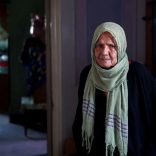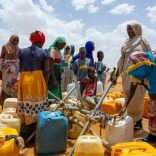Art curator Koyo Kouoh dies at height of career
Rising violence in Central African Republic uproots record 1.1 million

UNHCR/Chiara Cavalcanti / Asylum seekers continue to arrive from Central African Republic to the Democratic Republic of the Congo, driven by violence, insecurity and fear of imminent attacks in border areas. They are hosted in local communities along Ubangi River.
A record number of people – more than 1.1 million – have been uprooted in Central African Republic by spiraling violence between armed groups which threatens to plunge the country back into full-blown conflict, the United Nations said on Friday.
A surge in militia fighting in several hotspots since May has driven the number of people seeking refuge in neighboring nations to more than 500,000, while about 600,000 are displaced within the country, the U.N. refugee agency (UNHCR) said.
This represents the highest number of people forced from their homes since the conflict erupted in 2013, when the mainly Muslim Seleka rebels ousted the president, provoking a backlash from Christian anti-balaka militias, according to UNHCR.
With at least a fifth of the population now displaced, U.N. peacekeepers and national security forces are struggling to contain the rising violence, a U.N. report said last week.
“Fresh and fierce clashes between armed groups have wrought increasing suffering, deaths and destruction,” UNHCR spokesman Andrej Mahecic said in a statement. “If the violence goes unchecked, this could fully reverse progress towards recovery.”
Nearly one in two people in Central African Republic – more than 2.2 million – need aid amid the rising violence, says the U.N. Office for the Coordination of Humanitarian Affairs (OCHA).
Yet several aid agencies such as Medecins Sans Frontieres (MSF) and Plan International have been forced to temporarily suspend their operations in recent months, as militants loot humanitarian compounds, attack staff and raid health facilities.
Central African Republic is among the world’s most dangerous countries for aid workers – who have been attacked on about 200 occasions so far this year – OCHA’s country head Joseph Inganji told the Thomson Reuters Foundation last month.
The country’s humanitarian response plan for 2017 has been less than a third funded – $148 million of a requested $497 million – the U.N.’s Financial Tracking Service (FTS) shows.
“The consequences could be disastrous, if there are no further resources to meet the mounting needs,” Mahecic said.













Leave a Reply
Be the First to Comment!
You must be logged in to post a comment.
You must be logged in to post a comment.